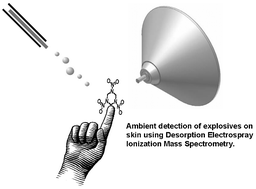Detection of explosives on skin in a few seconds
Posted in News on Apr 27, 2007
 A highly sensitive new method of testing explosives was developed by a group of scientists at Aston Labs – the research group of Professor R. Graham Cooks at Purdue University.
A highly sensitive new method of testing explosives was developed by a group of scientists at Aston Labs – the research group of Professor R. Graham Cooks at Purdue University.
Single nanogram amounts of the explosives such as TNT (Trinitrotoluene), RDX (hexogen), HMX(octogen), PETN (penthrite) and their mixtures were detected and identified in a few seconds on the surface of human skin without any sample preparation by mass spectrometry sampling method called desorption electrospray ionization or DESI, a proprietary technology introduced by Dr. R. G. Cooks.
Desorption electrospray ionization (DESI) is carried out by directing electrosprayed charged droplets and ions of solvent onto the surface to be analyzed. The impact of the charged particles on the surface produces gaseous ions of material originally present on the surface that can be analyzed by mass spectrometer.
In this experiment, a solution of methanol and water with addition of sodium chloride was sprayed onto human skin, a hand or a finger. If any of the explosives were present (with exception of TNT) they would form the chloride adducts with sodium chloride that were detected by tandem mass spectrometry. In case of TNT, the radical anions were examined to confirm the identification.
- Article citation: Dina R. Justes, Chem. Commun., 2007, DOI: 10.1039/b703655h
5 Responses to “Detection of explosives on skin in a few seconds”
Leave a Reply
Tag Cloud
-
adsorbent
benzene
china
chlorophyll
chromatographic
chromatography
column chromatography
CZE
DESI
electromagnetic induction
electrospray
ELISA
eluent
explosives
forensic
furosine
Gas Chromatography
GC/MS
History
HPLC
IC
isoflavones
lab-on-a-chip
LCMS
maldi tof
Mass Spectrometry
microfluidic
nano
Nano HPLC
nanoliquid
nanoscale
nanostream
nanotechnology
nanotubes
News
organic molecule
protein
Rickettsia
rmsf
rocky mountain spotted fever
science
soy
TCM
ticks
tsvet



Muchas gracias. ?Como puedo iniciar sesion?
AKvIlaQgqDmkEzb
cneHGFQCKVpBsh
Actually there are portable mass spectrometers. Jet Propulsion Laboratory â?? NASA has been putting one in every Mars rover for on the spot analysis of soil and gas samples.
I wonder if there is any practical application to this method. How feasible is to have MS at the airports? They use FTIR these days, but MS, I dont know.